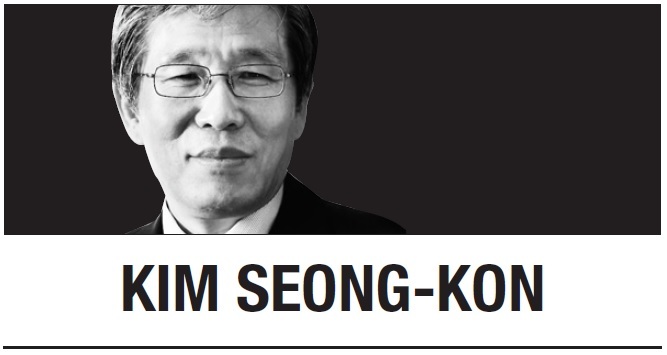For the past few years, there has been derision and contempt between the young and the old in Korean society. Politicians, who have often instigated such hostility to get votes, are primarily responsible for the generation war. Nevertheless, both generations have problems of their own.
As for the young, they tend to think that they know everything. They believe they know love, life, and the world quite well. As a result, young people are impetuous. They never think they are too young to know everything. Nat King Cole’s famous song, “Too Young,” well reflects such a tendency: “They tried to tell us we are too young/ Too young to really be in love/ And yet we are not too young to know/ This love will last though years may go./ And then someday they may recall/ We were not too young at all.”
In the eyes of older people, however, young people do not know love, life and the world well enough. For example, young people sometimes hastily take their own lives when their romantic life confronts obstacles or objections from their parents. Standing before their tombstones, older people would click their tongue and silently whisper, “You shouldn’t have done it, my dear. You could’ve met an equally good or even better person in the future.”
The 1967 Swedish film “Elvira Madigan” mesmerized young people worldwide. In the movie, the beautiful Danish slack-rope dancer Elvira Madigan elopes with a Swedish cavalry lieutenant who has deserted his regiment to be with her. Without money or prospects, however, they end up dying together before long. The man shoots Elvira and then kills himself. Later when young fans of the movie become parents with a daughter, they find the movie no longer fascinates them. Instead, the once deeply touching movie becomes a dreadful nightmare.
As young people get older, they come to realize that they did not know anything when they were young and still know nothing. The famous French chanson “Now I Know” well illustrates the truth. It goes like this: “When I was a child,/ I said, I know, I know, I know, I know./ When I was 25, I knew everything./ Love, roses, life and money./ The clock has struck 60/ Now I know, I know you never know/ Life, love, money, friends and roses./ That is all I know!”
The younger generation also does not know things that happened before they were born. For example, how would they know the atrocities of the Korean War? How would they know the terror of communism that devastated the Korean Peninsula? How would they know the military dictatorship that ruthlessly oppressed the people for almost 30 years? How would they know the poverty and hardships the Korean people had to endure in the 1960s and 1970s? Perhaps they would never know. The Korean film “Ode to My Father” splendidly illustrates the younger generation’s ignorance of and apathy to the turbulence of modern Korean history.
As you grow old, you will know that “life is but a dream,” so you “row your boat gently down the stream,” as the famous children’s song says. That is why you should be modest and humble, as you get old. You should not be greedy or crave for power. Old age is not a privilege, but a responsibility. Now, you should give up all good things for the young. Old age does not give you dignity or respect automatically. You should earn it through decency and integrity.
Unfortunately, however, older people in our society, too, tend to think that they know everything. As a result, they become overbearing and arrogant. They naively assume that they know things better simply because they have lived longer. As the above French chanson says, however, the only thing you know at 60 is that you did not know anything when young and still know nothing.
As we grow old, we are likely to become as stubborn as a rock. Then, we will end up being a laughing stock before the young, who will mock us as “kkondae.” Besides, in this electronic era if we do not even know how to use a computer or smartphone skillfully, how could we possibly think we know everything?
In his monumental poem, “Sailing to Byzantium,” W.B. Yeats states the agony of getting old. The poet suggests that when we grow old, we leave the country of the young who neglect the old. Then we sail for the holy city of Byzantium where our souls can sing and engage in imaginative and spiritual work. Otherwise, “An aged man is but a paltry thing/ A tattered coat upon a stick, unless/ Soul clap its hands and sing.”
Today, the gorge between the young and the old in Korean society seems irreducible. In order to “close the gap and cross the border” between the two generations, both parties should be modest and understanding, and above all, embrace their differences.
Kim Seong-konKim Seong-kon is a professor emeritus of English at Seoul National University and a visiting scholar at Dartmouth College. The views expressed here are his own. -- Ed.
By Korea Herald (
khnews@heraldcorp.com)








